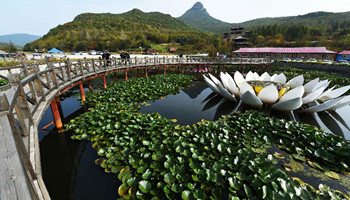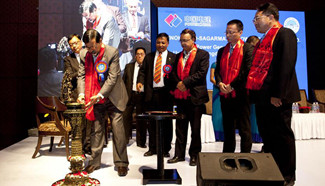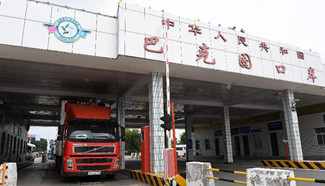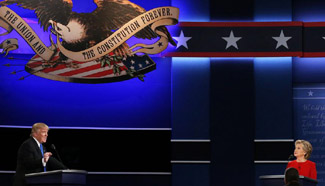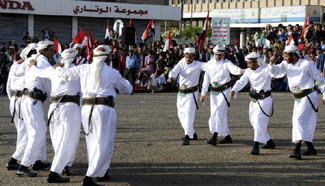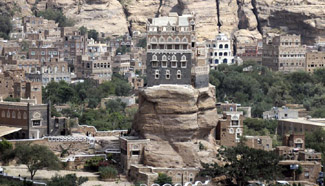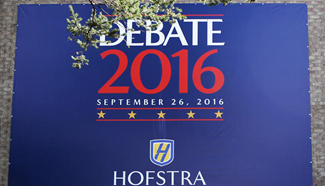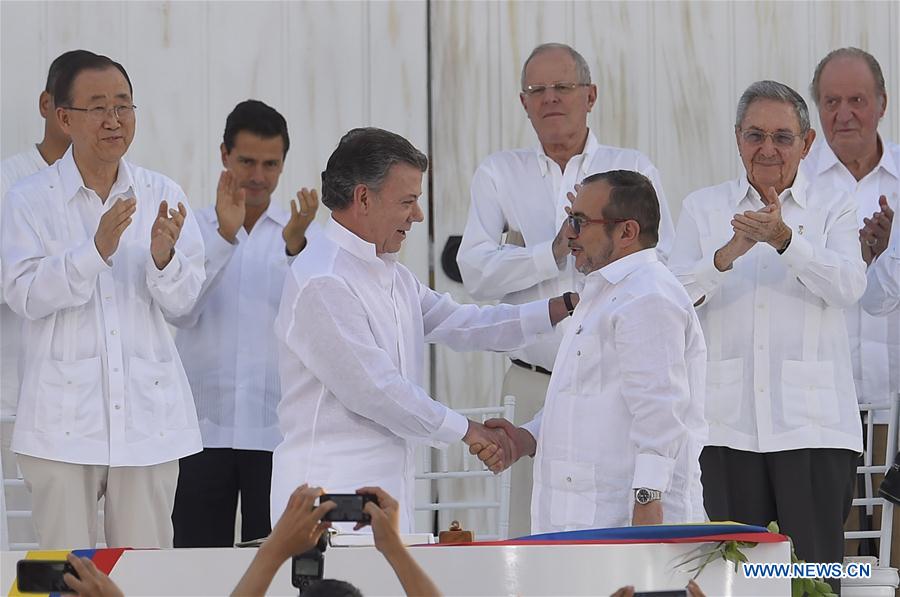
Image provided by the Colombian Presidency shows Colombian President Juan Manuel Santos (L Front) shaking hands with Commander in Chief of the Revolutionary Armed Forces of Colombia (FARC) Timoleon Jimenez during the signing ceremony of the final peace agreement between the Colombian government and FARC, in Cartagena, Colombia, Sept. 26, 2016. Juan Manuel Santos and Timoleon Jimenez Monday afternoon signed a historic peace deal in Cartagena, ending a 52-year conflict. (Xinhua/Juan Pablo Bello/Colombian Presidency)
By Chris Dalby
CARTAGENA, Colombia, Sept. 26 -- After over five decades of war, Colombian President Juan Manuel Santos and FARC commander in chief Timoleon Jimenez met here to start a new chapter in the country's history.
On Monday afternoon, the oldest conflict in Latin America was consigned to the history books when the two men signed the peace agreement, finalized last month in Havana.
Accompanied by the presidents of Cuba, Ecuador and other Latin American countries, as well as UN Secretary-General Ban Ki-moon, the two men then signed the agreement with pens made from bullets to symbolize the transition to peace.
"We have lived, we have suffered, for 52 years, an armed conflict between the sons of the same nation," said Santos in his address. "Today, Colombia and the international community ... hail the peace agreement as the best news in a world convulsed by war, conflict, intolerance and terrorism."
In a gesture to the FARC, Santos said that "when you begin your path of return to society, when you begin your transition to a political movement without weapons ... as head of state of a nation we all love, I welcome you to democracy. To change bullets for votes, weapons for ideas, is the bravest and most intelligent decision that any subversive group can take. You will hear the call of history."
Santos acknowledged that future political challenges await. "We will surely never agree on the political or economic model our country should follow," he said, referring to the FARC. "But I will defend with all my determination your right to express your ideas within a democratic setting. This is the essence of liberty."
Speaking before Santos, Jimenez had taken a conciliatory approach, pledging that the country's largest guerrilla group would lay down its arms for good.
"Let nobody doubt that we will enter politics without weapons. Let us all be ready to disarm our minds and our hearts," he said. "With the agreement we signed today, we hope to put an end to the long history of violence that has made our country bleed."
In a much anticipated moment, Jimenez formally apologized for all the violence caused by the FARC during the conflict. "I would like to ask for forgiveness for all the pain that we have caused during the war."
However, he also articulated the peace agreement as a victory for the FARC's aims. "Let it be known that the FARC tried in all ways to spare Colombia a prolonged conflict. This is a victory for the entire Colombian people and the international community," said Jimenez.
This day comes after over four years of negotiations in Havana, Cuba. The two sides came to an agreement on five points: rural development, the participation of the FARC in political life, the end of the conflict, the struggle against drug trafficking and reparations to victims.
The last step will be taken on Oct. 2, when the Colombian people will vote on whether to accept the agreement or not. Recent opinion polls show a large majority in favor of supporting it.
However, the future remains tense for the country. During the ceremony on Monday, former president Alvaro Uribe led a march of over 2,000 people in Cartagena to reject the agreement. Uribe believes the agreement is too beneficial to the FARC, providing them with impunity for past crimes.
Banners reading "No more FARC, no more Santos, no to the peace agreements" were waved in the Zapatos Viejos park.
Uribe's right-wing party, Democratic Center, has become the flag-bearer for the campaign to reject the peace deal. Uribe is hopeful that the population will decide the deal is too favorable to the FARC.
According to Uribe's "No" campaign, a rejection of the peace deal does not mean a rejection of peace altogether. Speaking to the press on Friday, Uribe said that "the agreement gives them an open amnesty for very serious crimes such as drug trafficking ... and other crimes against humanity, such as the rape of little girls."
His chances of success appear slim, however, since a poll by Gallup Colombia, carried out between Sept. 14-18, found a majority of Colombians in favor of the deal, with 67.6 percent planning to vote Yes.
Furthermore, other conflicts remain to be settled. While the National Liberation Army (ELN) has said it will hold a ceasefire until the Oct. 2 vote and while early talks have begun for a peace process with this group, attacks may still occur.
However, during a visit to the FARC's jungle stronghold last week for its Tenth National Guerrilla Conference, Xinhua found an optimistic mood among the group's members.
On Friday, Ivan Marquez, part of the FARC's commanding group, told the conference that "we inform the country, the governments and people of the world that the guerrillas, delegated to this Conference, have given their unanimous backing to the final Havana agreement."
He also announced that the FARC was expanding its central committee from 31 to 61 members, who face the challenge of outlining the manner in which the group will transition into a new political movement.
Harvey Arenas, commander of a FARC squad, told Xinhua that "our fight sought the well-being of all Colombian people, for democracy and social justice."
"We are not afraid to leave the weapons. We took up arms, not because we wanted to, but because they forced us to. We always wanted a peaceful solution ... but that door was closed to us," said Arenas.
Others plan on remaining faithful to their group's orders, even in peace time. "I will do what the party says. I am not thinking of breaking with the party. We succeeded with them and we are ending with them. If the party tells me to go and sow yucca, bananas or maize, I will do it," David Preciado, a guerrilla fighter who lost an arm in a fight with the military, told Xinhua.
However, one of their major preoccupations continues to be the threat of paramilitary attacks from right-wing groups.
In the months ahead, the FARC members will have to gather in 23 security zones across the country, where they will lay down their weapons, under supervision by the United Nations (UN) and other international organizations.
Once this takes place, the FARC will give the government a list of all combatants present in each zone. Most of them will see all charges and arrest warrants against them dropped as part of the amnesty process. Others, facing more serious charges, will be able to avoid jail sentences if they come forward and confess, although they will face restrictions of liberty. Those who do not will be treated as criminals and prosecuted under the law.
The months ahead will certainly test this peace agreement. As fighters come down from the jungle to lay down their weapons in the security zones, their enemies may feel it is their chance to strike. Segments of the Colombian population who vote against the agreement may seek other ways to derail the peace process. President Santos will face re-election in 2018, and should another party win, peace might be at risk.
However, this evening, Colombia stopped being a country at war and became an example for the world.
Related:
Colombian gov't, FARC sign historic peace deal
CARTAGENA, Colombia, Sept. 26 (Xinhua) -- Colombian President Juan Manuel Santos and FARC commander in chief, Timoleon Jimenez, signed a historic peace deal on Monday afternoon in the city of Cartagena, ending a 52-year conflict. Full story
Backgrounder: Chronology of Colombia's peace process
BOGOTA, Sept. 26 (Xinhua) -- The Colombian government and the Revolutionary Armed Forces of Colombia (FARC), the country's largest rebel group, on Monday signed a historic peace deal that seeks to end 52-year armed conflict in the South American country. Full story
Spotlight: Latin America celebrates end of its oldest conflict in Colombia
BOGOTA, Sept. 26 (Xinhua) -- At 5 p.m. Monday afternoon (2200 GMT), the oldest civil conflict in Latin America will be consigned to history books when Colombian President Juan Manuel Santos and FARC leader, Timoleon Jimenez, sign a peace agreement, finalized last month in Havana. Full story




